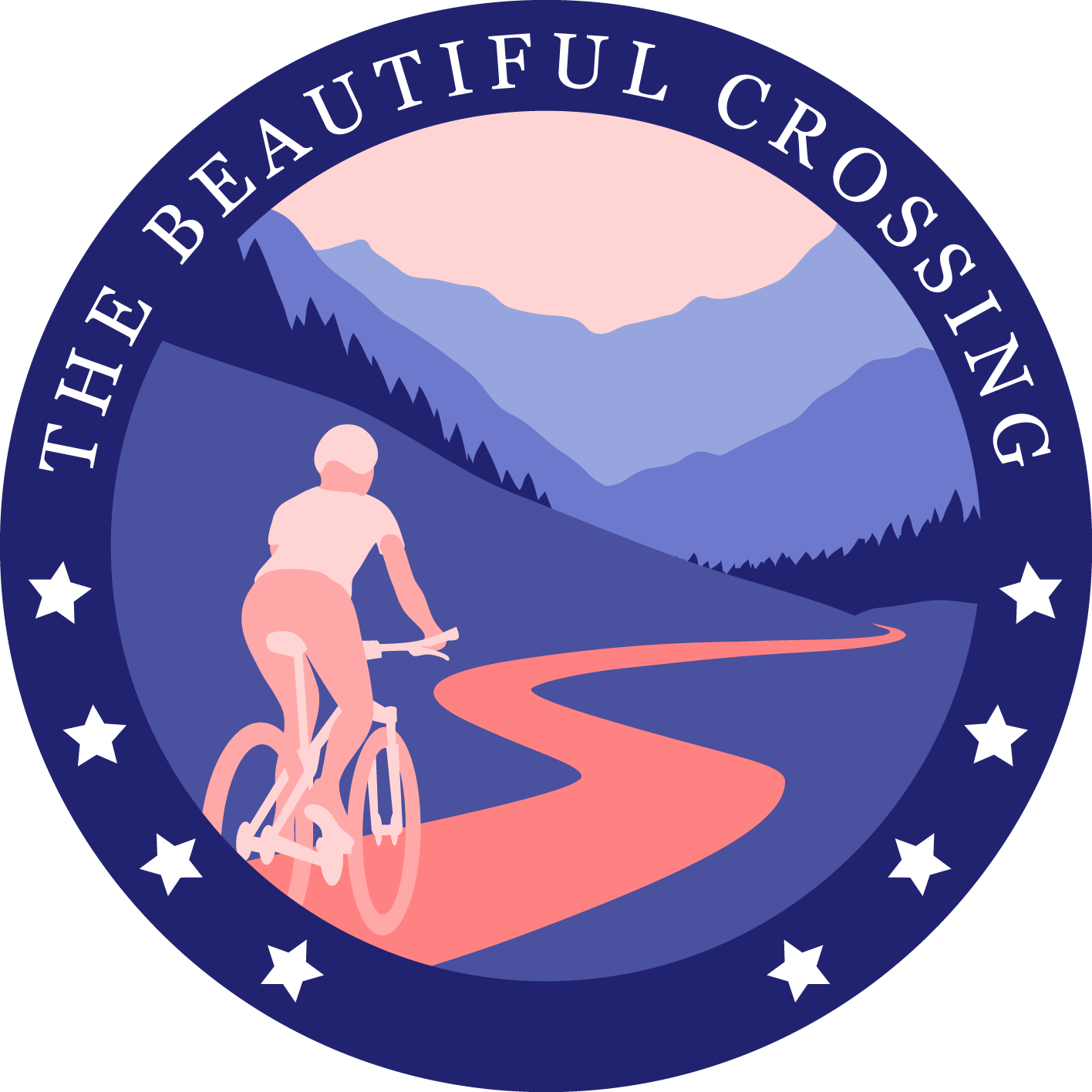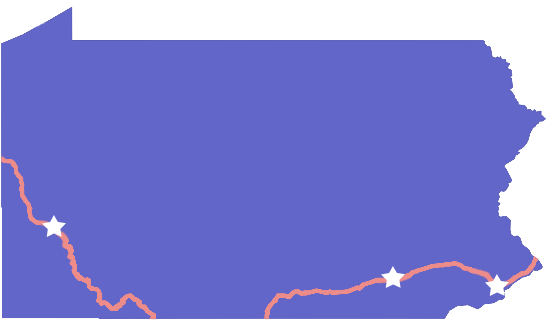
Pennsylvania
Mustafa
Lancaster, PA
“But then we came to the United States at a very interesting time. So we came here when there was a holiday – which we didn’t know about. So when we got to the United States, it was Halloween Day… and our neighbors were just going around, trick-o-treating. And we had never seen anything like it. So we had these kids come over to our house when we just got here! And ah, you know, started knocking on my door. I remember opening the door and just like having such a shock – with these people in costumes! And I didn’t know what to make of it. So you know, they ask you for, “Trick-o-treating!” And I thought they had like welcome bags, so I ended up taking their bags. It was a very interesting start to the country!”
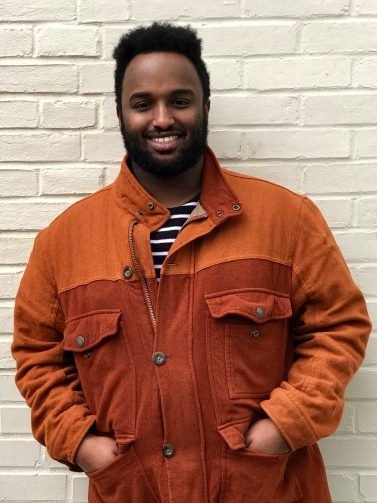
I am originally from Somalia, and I have been in the United States for three and a half years now.
So yeah, I came here with my Mom and my siblings. So I have – I have four sisters and three brothers, and I am the oldest so I came here, I guess, with my whole family at the same time. Unfortunately, I lost my father 10 years ago. I have been the head of the house ever since I was eleven years old, so that was a role I have been playing for a long time. But it’s just, that gets more – you get more pressure when you come to the United States playing that role because you gotta really provide for your family in here to really make it.
My first day? What I remember about my first day in the United States was we – I remember the plane ride very well. It was my first ever long plane ride. So we left Nairobi. Then we had a layover in London. So I remember feeling so overwhelmed in all the activities happening in the airport. People running round here and there… and then I remember landing in New York airport. I remember being handed a big apple – that was the first thing I had in the United States. It was a big gian apple, and I had never seen a giant apple like that. I’m used to apples being so tiny. So that was my first American experience – having a giant apple. And then I remember the ride from New York to Lancaster and just being in awe – just looking through the window and going through all these buildings, and all this land, and all these farms. And just looking around I was just so intrigued and excited. Yeah, that’s my first memories.
But then we came to the United States at a very interesting time. So we came here when there was a holiday – which we didn’t know about. So when we got to the United States, it was Halloween Day. So I had a very interesting start to my American life. So what I remember was just getting to the house, being settled in – our caseworker who met us at the Lancaster airport told us or gave us a brief discussion about the house and what’s what. And there was some food there being prepared by some of the refugee community. And then he left, so we were just by ourselves – relaxing. And our neighbors were just going around, trick-o-treating. And we had never seen anything like it. So we had these kids come over to our house when we just got here! And ah, you know, started knocking on my door. I remember opening the door and just like having such a shock – with these people in costumes! And I didn’t know what to make of it. So you know, they ask you for, “Trick-o-treating!” And I thought they had like welcome bags, so I ended up taking their bags. It was a very interesting start to the country! That’s when I realized the sense of, “Oh my, we are in a different place!” Yeah, but I mean right now, my sisters enjoy – that’s one of their favorite things is to get ready and join their friends for trick-o-treating. So it was an interesting start, but we got used to it.
The hardest thing, I would say, is the immediate culture shock you go through and that stays with you throughout the different times. Ummm transportation. I mean you are in a new country. The seasons are changing. It gets cooler… and we also came at a time when the refugee issue was being a little bit politicized. There was an election happening. So I felt like we just got here and then all of a sudden we are standing out too much, and that was so hard on my family! We were in a neighborhood with only Somali Muslim people, and we didn’t really feel comfortable. But you know, that changed quickly. My sisters had a hard time adjusting to school. They were, I guess, the first hijab-wearing students to go the high school – to their school. And they had different experiences there, so that was also challenging.
The turning point came for me came, I think, a little bit around the end of the first year when I started feeling a little bit stable. And you know when I started seeing all well… And when my sisters finally felt comfortable to go to school and they were not coming back with horrible stories of, you know, being picked on. So when things started settling down – seeing my sisters start enjoying school, and seeing my Mom start attending English classes regularly and she was making new friends. And my job was going consistent… I mean that’s when you just stop and you realize, “Wait, this is really nice! And this could be a good future.” And that was like a little bit around my turning point. I would say the biggest part was making the realization that my family is getting comfortable and they are feeling like part of the community slowly by slowly. So that was the start of my turning point.
Ah since starting my life over here, I have seen so many different moments when I am like I am very proud. My first proudest moment was my sister right now who is starting college, and she will be the first female in my entire family to go to college. So that was like a very proud moment for me, and I mean that’s gonna be some pressure on her, but it has been very exciting. So my mother, my grandmother – I mean no female in my entire existence I know has gone to college! So my sister is the first female to go to college in my family. So that has been the proudest moment.
The other proud moment I have is starting my own business in the United States. So I started Bridge, which is a social enterprise business that connects families and refugee families to their neighbors and introduces people to the cultures of the refugee community. So yeah, that was another proud moment. Just winning the business competition, and being the first refugee to do that here – that was, that was nice!
What the concept of home feels like to me is a sense of belonging and feeling like you are part of the community. So I think that we have found that in Lancaster. And home to me, has been seeing my Mom sleep after like long years of nights of not being able to comfortably sleep. So that is like peace to me, and seeing my Mom going to sleep at night and peacefully sleep. That feels like home to me.
If you take some time and just really just learn a little bit about the refugee issue, then you are going to find out that everybody who is a refugee – who’s kind of a refugee – did not have that choice of becoming a refugee. It’s just situations that happening to them, circumstances that happened to them that really led them in that situation. And everybody has the potential to go from that stage of being vulnerable and being in a situation where they are not feeling like – you know stuck, to really improving their lives and being a contributing member of the community. And just realizing that there’s mothers and there’s children, and there’s somebody like you, somebody like your friend, somebody like your mother – just who all have a different title, and it’s a refugee. Yeah.
Ameerah
Pittsburgh, PA
“Actually to be honest, when I came here at the first, I felt myself that I was in a big movie. Actually, that was something funny, but after that I am used to live in Pittsburgh. So of course when I came here it was shock for me, but not a big shock – no, because there was many people just like me. There are many Muslim people here, and I had – you know – previous experience with Pittsburgh. But the problem was with my kids, not for me. It was for my kids, because when they came here they saw many differences here.”
Photo Credit @joy.bittner
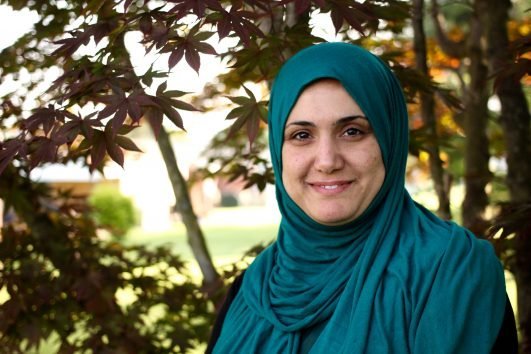
I am originally from Iraq. I have been here almost 6 years ago.
I heard many things about Pittsburgh when I – before I came to America. Many people they told me different things about Pittsburgh. They told me that it has more people, Muslim people, Arabic people. And that’s right, I saw that when I came here, and everything was on my expectation and everything was nice in Pittsburgh. They told me that it is good for living, in cost of living. I mean, it’s cheap. All expenses here is cheap. It is cheap in living and, you know, food and clothes. And we have – we could find a chance for – there are many opportunities for work in Pittsburgh, so I find everything here.
Actually to be honest, when I came here at the first, I felt myself that I was in a big movie. Actually, that was something funny, but after that I am used to live in Pittsburgh. So of course when I came here it was shock for me, but not a big shock – no, because there was many people just like me. There are many Muslim people here, and I had – you know – previous experience with Pittsburgh. But the problem was with my kids, not for me. It was for my kids, because when they came here they saw many differences here. Well, after that they used to live in Pittsburgh – everything was okay for them.
To be honest with you, when we – I mean – we felt more safe when we get our first tax (return) of the first year. You know, it was a big money so we were so happy! It was more than 9,000, because I start working when we first came here. My husband he start working, so we get a big tax (return). So my husband and I, we told ourselves, “Wow, that’s nice! That’s a good thing here in America! We can get more money, you know!” Right, we had more money in our country – we have been so rich there because my husband works there as a high (school) teacher, a math high (school) teacher. But the life is so expensive, so we need more, I mean, to make our life more comfortable. So when we get our tax (return) here, we loved to live here in America! So, it was a nice thing! So I think this was the turning point for us.
I see myself maybe in a different state and in a different house. I’d like, I mean, I wish if I could buy a big house, a bigger house in a farm. In the middle of farm. I love to live this life. I love to get more experience about the farmer’s life, you know. Maybe, I am not sure, maybe after five years we are going to get a bigger house in the middle of farm. Maybe we are going to stay here, but have no idea! I don’t know, but I wish to get this house – bigger house in the farm.
Actually the refugee, they are just – I mean – normal people. They had a bad life in their country, and they had a bad experience because of the political situation in their country. So of course there is no one being out of his country – but, I mean, they had to leave their country. They had to! But they don’t want, they don’t want to leave their country! But, you know, because of the situation in their country, because of killing and kidnapping and explosions, so… Of course, refugee people – they are poor people, so they want more life more safety here. They don’t want to make any problems or any issues here in America. But they want to get normal life, just like their country when they being there. So, that’s it. That’s it.
Maryam
Pittsburgh, PA
“What I am most proud of is being able to remain original to who I am, and true to myself. A lot of Arab girls and Arab guys tend to lose themselves here. They forget to speak Arabic – they forget where they came from, and then they look down on others Muslims and Arabs for celebrating that! I have met a lot of people like that, and I am proud of myself that I was able to stay true to myself even in a school that only has five Arab kids. And I always told them, “I pray. I, you know, fast.” And I wasn’t afraid of what the outcome was of what they were going to say. I just said it and did it, and I wasn’t afraid of anyone judging me. So I am proud of that.”
Photo Credit @maryam
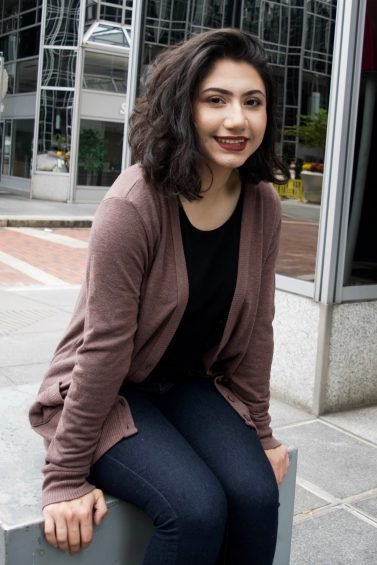
I am originally from Iraq, Baghdad, and I have been in the US for 5 years now.
I was really confused that day – I came, I didn’t know if it was day or night. Obviously I went off the plane and it was night, and we were rushed into the house. I don’t remember who I saw – I don’t remember anything! I just remember being from car to car and then driving to my grandparents’ house in Oakland. And… my uncle and my aunt were there. They welcomed us too, and then me and my sister and brother went straight to sleep. They were away from us beginning from Iraq. I was young and so I don’t remember the exact time whenever I stopped seeing them. I did talk to them on Skype like one or twice every week. And so they really made us feel like we were in their house – and we did the same, like vice versa. And it kind of made it easier for us to be, you know, while being away from them still being connected to them. Still, you know, growing and knowing about them – cause that’s really important. And you know, just it was better than not being able to speak about them
I would like to see people knowing about Ramadan or kind of just Eid and stuff, instead of feeling like we are isolated.
Pittsburgh is definitely welcoming. You know, it is much easier than other states to begin with, to start out your life. For kids and families – people are more understanding here. I see in different states, they are harsher. And I saw that through YouTube and Social Media, many Muslim women who wore the hijab were attacked in other states. I would never see that happening in my state. I never knew anyone who was attacked here. And so I think this is really great, you know. I love that about Pittsburgh, that people are understanding. Even if they have a negative view about it, they keep to themselves and at least they can put on a persona where they are accepting of it, you know. At least it’s not as harmful as what they could do other than that. So I really like that about Pittsburgh. There are a lot of young people here, you know, coming to study, and they do change the view and you know how the world sees us – and how the world sees LGBT, and what’s not considered to be the norm. This is kind of celebrated here.
One thing I like about here is meeting new people from all around the world. In Iraq, you only see Iraqis, and here you get to meet with people from all around the world – hear about their experiences, hear about their point of view on everything. One thing I like about here is how easy the life is when you work hard. It really is easier than Iraq, because in Iraq you can work hard, but it’s not guaranteed that you can buy a house or buy a car or work with the degree that you have. Here if you work hard, life goes – you can create the life that you want. You know, create the life that you want, that you have always dreamt of.
What I am most proud of is being able to remain original to who I am, and true to myself. A lot of Arab girls and Arab guys tend to lose themselves here. They forget to speak Arabic – they forget where they came from, and then they look down on others Muslims and Arabs for celebrating that! I have met a lot of people like that, and I am proud of myself that I was able to stay true to myself even in a school that only has five Arab kids. And I always told them, “I pray. I, you know, fast.” And I wasn’t afraid of what the outcome was of what they were going to say. I just said it and did it, and I wasn’t afraid of anyone judging me. So I am proud of that.
I am hoping to have a child first of all. That’s not the most important thing, but I do want a child because I am already engaged to my high school boyfriend! And we are planning to get married next year or this year, and you know, move on from there – study together, move to another state from there. So hopefully I will have my bachelors by then, or close to? And you know, already have settled with him, you know, have a child. So just have a peaceful life.
He’s from Iraq. Yeah, I have known him for a long time. And I kind of hid it from them at first because I didn’t know what they were going to say. Along the time, my sister threw hints. They were like, “Oh, she’s dating someone!” And they were – they were surprisingly okay with it. They, you know, really liked him – and that’s when they were like, “Okay, but you realize dating is forbidden in Islam?” They were afraid of what was going to happen, of what if I – which I didn’t because he wasn’t thinking about that – but what if I was going to get pregnant while dating. They were afraid of that, so they were like, “Okay, we encourage you to move onto the next step and get engaged and, you know, to kind of – for it to be more serious.” And so we were like, “Okay,” because we both knew we were the ones for each other. We have been dating for five years, engaged for one year now – so I know that he’s the one.
ZING
PHILADELPHIA, PA
“Refugees, we are looking for refuge, right? And there is nothing wrong with accepting refugees. The more you accept, I think, you have one bowl of rice, right? And then you share with more people, it is good for them? And how you going to feel? The more we share, the more we receive a blessing…”
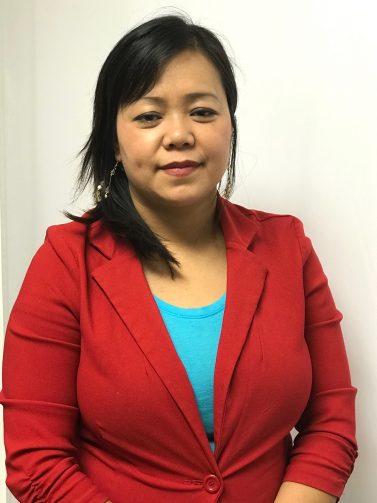
“I am originally from Myanmar, Burma – 2009 I got here. It’s very hard to make family time in America, you know! We all are busy, and husband and wife have different schedule and kids have their own activities. It’s very hard to find family time, and we need more exercise. Like before that, now they watch computer, and TV, and phone. I don’t like that – you know? And here I think like respect, we need more respect each other – like especially in my country, the kid respect adult, or like grandma or grandpa. And this here, you know, respect – where we can find respect? It is very hard to find people like this, especially the children. They don’t know how to respect the grandma, grandpa, the parent.
My dream is to have a small business, because the reason why I have this hope is like we come from very poor country, and we grow up with very financial problem. So like that my idea is why are we always like that? Let’s do something, you know, special – maybe working hard, and then have a small business. And then I will have income, and with income I can help more people and even hire a staff who don’t have – who are from refugee, from Burma, who don’t have a job. People who cannot have a skill, who cannot have a job, who cannot drive. You know, who really need help. I can hire them and train them, and then they can earn a small income so they can support the family.
Refugees, we are looking for refuge, right? And there is nothing wrong with accepting refugees. The more you accept, I think, you have one bowl of rice, right? And then you share with more people, it is good for them? And how you going to feel? The more we share, the more we receive a blessing. So if America want to be a great country, and like blessed country, they should accept more refugees and they should help more who need help! Being a refugee is not by choice. Even people need help! So what can we do? Just help them!”
Mussie
PHILADELPHIA, PA
“So we were refugees in Uganda, and we are used to discipline from the teachers. If you did something wrong, they would use sticks to discipline you and we learned to respect the teachers very much. When we came here, the students could insult the teacher, throw books around. The teacher couldn’t do anything. And that was a big shock…”
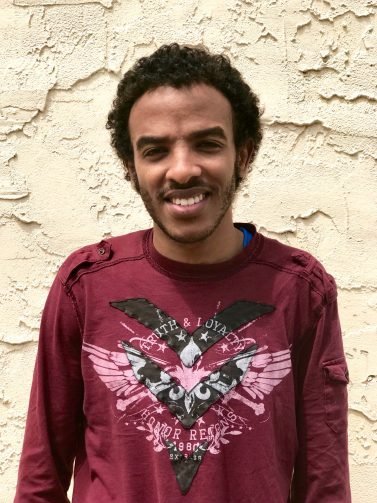
“I am originally from Ethiopia. My parents are from two different countries, Eritrea and Ethiopia. They used to be one country, but they split at some point, and that is partly the reason for why we became refugees. And I have been in Philly for five years.
I mean a lot of refugees move to other countries because they are not able to live in the country they would like to live in – and most of the time coming to the U.S. was not a choice. Actually we almost went to Australia in 2008, and something happened and we ended up not going. But we ended up in the U.S. and it is not a choice, it is something that you have to do. So yeah, being refugee is not a choice – it is not because I wanted to be a refugee. It is something the circumstances forced us to be refugees.
When we first came to the U.S. we landed in New York at JFK Airport, and I remember the smell of the food in the airport. It is food that I had never experienced before.
The next week we enrolled in school, and it was very different from… So we were refugees in Uganda, and we are used to discipline from the teachers. If you did something wrong, they would use sticks to discipline you and we learned to respect the teachers very much. When we came here, the students could insult the teacher, throw books around. The teacher couldn’t do anything. And that was a big shock. We were like, why why is he doing nothing? And the students are disrespecting him like crazy…
I miss nature. Here I live in a city, so I don’t see much of nature but in Uganda we lived – the camp where we lived, it was very nice! Not many refugees say that. And actually it was, I read an article, it was probably the best camp in the world. The best refugee camp in the world. It was very organized. People lived in communities, we went out for runs in the morning, and it was really nice – like isolated areas where there is no one, just nature. And we always played soccer and things like that. I miss the nature.
Currently I am enrolled in school at Penn State, and I am studying engineering. So I hope to work in the engineering field.
One thing that makes the U.S. different in my opinion is that once you hold a U.S. visa, you can travel anywhere in the world without much hassle. Holding an Australian visa, for example, doesn’t give you as much power as holding an American visa. So that gives you – opens a lot of doors for you. You are kind of the author of your own destiny. You have a lot of opportunity to become whatever you want, and that is not something that you find in a lot of other countries. Most other countries, and I like that about the U.S.”
Ashok
PHILADELPHIA, PA
“When refugee comes here, they do not just come here with what they have belongings – like backpack, or something like that. They can come here with more things, not just what they carry.”
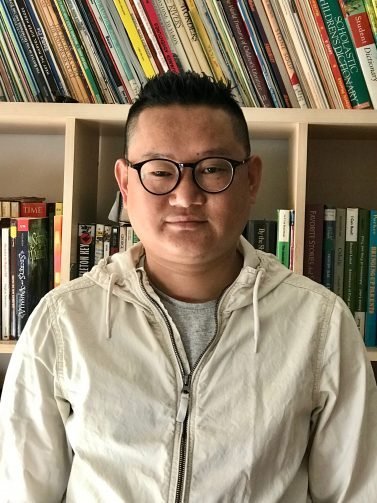
“So actually I was born in Bhutan. I left Bhutan when I was three years old. I came to Nepal as a refugee. I spend there 18 years. And I finally got a chance to get resettled in U.S. back in 2010, so I have been here almost 8 years. I have one daughter, and coming soon another child.
When I landed in U.S. the port of entry was New York – New Jersey! So I was so tired that I made a pillow of my backpack, and I slept on the floor of the airport for like half an hour. I took nap there. That I still remember.
From the first day of my life in the city, I do find like a lot of helpful people – I can’t forget them in my life. So yeah, I feel really welcomed here.
Here is a lot of opportunities that we didn’t have when we were in refugee camp. The futures of our kids will be bright here. I see these beautiful futures for our upcoming generation, so I am really proud of these things.
Refugees are not refugees because of their interest. They have some situation that made them refugee. So they are not refugee by their own interest. When refugee comes here, they do not just come here with what they have belongings – like backpack, or something like that. They can come here with more things, not just what they carry. Einstein was also a refugee, and he is like the most renowned scientist in the world. So he has one saying that is: refugee, they don’t just come with their belongings.”
Kyuba
PHILADELPHIA, PA
Okay. He asked me, “Why do you like that country?” I said, “First one, it is a super power in the world. First one. The second one, in America I will learn many things. There is many knowledge in America.” He said, “What would you like to study in America?” I said, “I like so much first to study international relations, but I don’t know. To find the job, because to find the job in that option is difficult to find the job. And the second one, I like to study computer.”
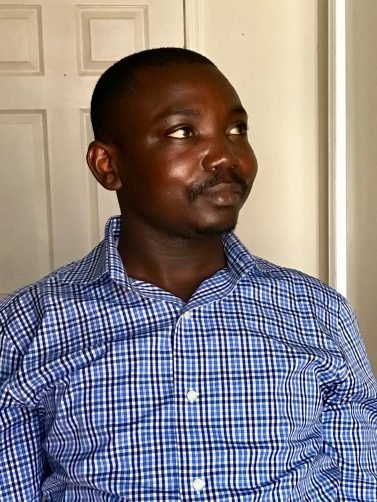
“I am coming from Congo, I live here in United States from 2016 until now. In June, it will be two years.
Even when the first time when I was in Zambia in a settlement, in resettlement – when they asked me the country is coming and the people will do interviews. They said, no Canada is coming. “Canada? Oh my God, I don’t like Canada! To go to Canada? I don’t like Canada.” And the people said, “You said you don’t like Canada! We need Canada!” And I said, “No me, I don’t like Canada. I like America.” The second country to come was Norway. Because there is a resettlement officer who was there who was from Denmark asking, “Do you like Norway?” And I said, “No, I don’t like Norway.” He said, ”Why?” I don’t know… “Which country you like?” I said, “The country I like, I like United States of America.” He said, “Oh my God, you cannot find that country. If you like, I can now put you and go to Norway.” I said, “No. The country that I know very well, in my opinion and everything is America.” He said, “Are you sure?” I said, “Sure.”
Okay. He asked me, “Why do you like that country?” I said, “First one, it is a super power in the world. First one. The second one, in America I will learn many things. There is many knowledge in America.” He said, “What would you like to study in America?” I said, “I like so much first to study international relations, but I don’t know. To find the job, because to find the job in that option is difficult to find the job. And the second one, I like to study computer.”
When I came first time to get to the United States, I was in New York. Airport from New York. After that I take the car until airport of Philadelphia. When I came, because when you came from the country to another country, there are many challenges. Maybe you can found, but you must be patient.
Because before I came, the teachers about America – when the teacher they said, “No, maybe your first job it will be hard for you. But until when you start doing well, you will see that America now is good. It is good. And you’ll find maybe your second job – it can be good.” But when I get here, I see many young people – two month, move. Two month or three months, move the job. I said, “Ah, why? Two month, three month, the people move everytime! Everytime! But no good!” But like me, I like to stay in job even in 5 years, two years. When they ask me, what experience you have? I can say you know, experience two years. Because experience start by two years and it go up.
If you have a good job, the life will be easy here. But if you don’t have a good job – you will see every time like now you will start to say, “Oh, America is no good!” Because there is many – when you get your paycheck and you come home and start to make now your budget, you will see that the money you recieve is – “Oh my God! This country is no good.” They take their money because you have the job that is no good. If you have a good job, you will see America is good. Maybe you can save two hundred in your account. You will say, no America is good. But if there is no money you save, you will start to say this country is no good.
The first job, the first time I go to interviews they ask me first, “Do you have certificate?” I said yes. They said, “Do you have high school diploma?” I said no, I don’t have. Now I am going to ESL class, and I want to get first – if I get first the test of GED. It means here in America that if you don’t go to school if you don’t have any paper, to offer you the job is difficult.”
Merhawi
PHILADELPHIA, PA
“It was one summer that I – I don’t remember how it was – but I got so much into photography. The whole summer I was just all night seeing all kinds of, watching kinds of techniques of photography and documentaries. I really wanted to buy a camera, but I was not working that summer and I didn’t have the money. But when I got back into school that year, my senior year in high school, and my art teacher told me that there is this program which high school students can apply.”
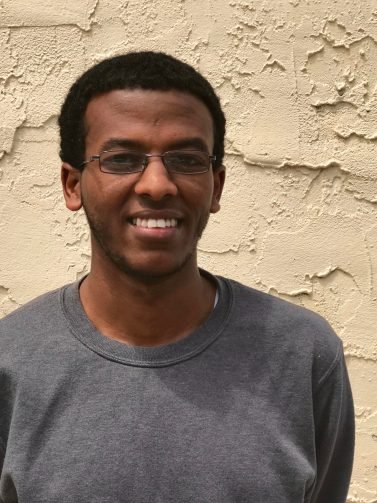
“I have been in the U.S. for about 5 years now, and originally I am from Ethiopia but I moved to Uganda as a refugee. I lived there for about 9 years, and I moved here then. I came with my whole family of six members: me, my two brothers, sister, and parents.
I remember the first time we came and we got in the house, and they had prepared for us… They had prepared for us chicken. It was cooked in a similar way to what we cook culturally, the way we cook chicken. But it just, it didn’t taste… because the chicken we had eaten before, like throughout our lives, it was just a given that it was organic, because we are in Africa – there is no way it can be anything else. So there was definitely a difference that I could taste. It didn’t quite taste that good, and it was kind of a… it was kind of a foreshadowing of what to come to be honest.
I remember when I heard that the way it works here is that when you get to college you can pick whatever field you want and you can pretty much choose completely on your own and go in that path without anyone’s influence if you wanted. And that was kind of a new thing, because I was used to the idea that you ah I think have to kind of do what I am told.
When I first got here, we went into the high school we were put into. It was not a good school at all. I was kind of like living in a dream when I went to that school – a nightmare, I should say actually. And I was there for half a semester, and I was going to go – I was thinking I was going to go there the next semester. But then the next semester it turned out that I was going to get into a different school, and it is like the third best high school here in Philadelphia. After I got in there that is when it kind of clicked for me that there is something kind of nice here. The students were respectful, the teachers… It was kind of like a nice environment to be in. The teachers and the students interacted well. And that was the first time it clicked. Like oh, I can kind of choose this school, or field, or whatever maybe and go where… Like I don’t have to be stuck in something I don’t want to be in.
It was one summer that I – I don’t remember how it was – but I got so much into photography. The whole summer I was just all night seeing all kinds of, watching kinds of techniques of photography and documentaries. I really wanted to buy a camera, but I was not working that summer and I didn’t have the money. But when I got back into school that year, my senior year in high school, and my art teacher told me that there is this program which high school students can apply. And it is a photography program and they will give you a camera for the whole year! And they will give you assignments, but you can pretty much do whatever you want with the camera and you can print whatever you want – they have all the supplies. And I was in disbelief! And I did that. I applied, and I got in.
Being American is, like I think of it as having this limitless capability to not only improve yourself but also the people that you have left behind. For example, something that we are thinking about recently – me and my brothers – we are thinking about using the technology of fingerprints and introducing it into a high school that my brothers actually went to in Uganda. Like you had three meals a day, and in order to get your meal, you had to – there was this system of a meal card that was given to you every week. And every time you got your food, like they put an ‘X’ on the box. And then if you lose your meal card, you are out of luck, no food for you. And we are kind of thinking about solving that using this system of fingerprinting where you cannot lose your finger.“
Amer
Lancaster, PA
“The thing that I will say that I am proud of is being able to help, and being the hand that supports people when they first come here. It is such a great feeling when you see people when they first arrive – how unsure and fearful of the future they are. And once you see them like in a couple years later, and you see a totally different person. They are, you know, settled at their jobs and their jobs and their kids are at school. They have dreams and they are thinking about the future.”
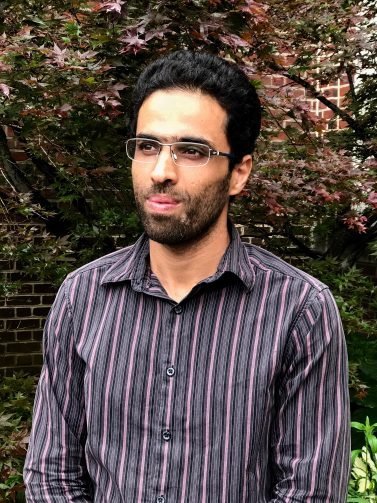
I am originally from Iraq, and I have been in the United States since 2010.
I was tired actually when I arrived, and I recall sleeping on the plane. So when I woke up, everyone was leaving the plane. So I was like, okay – what’s happening here? And then I got out, and my brother was waiting for me. So it was emotional – I got to see my brother after long years.
I lived a comfortable life in Iraq, and I came to the United States just because I was looking for safety. So I found safety here. You can work hard and accomplish things, and also there are systems in place. In Iraq, things were chaotic after the 2003 war, and they were never good like to anyone.
I would say that one of the hardest things that I faced was being able to figure things out without having clear guidance on things. So when I moved to New York state, I had to figure things out on my own. And although I had a friend, but he did not speak much English and also he had limited connections within the community. So I was just trying to figure out a lot of things on my own, and getting a lot of no-s. You know, looking for a job or even filling out a job application which is something that I am not used to because it is not part of the hiring process in Iraq. Being able to find an apartment. Find someone who is able to consign for you. Credit – all those different things that are like new to me. So I had to do a lot of research, ask a lot of people to avoid making mistakes.
In 2012, I started working for CWS as a resettlement caseworker. I consider myself blessed. I got to work with people from over 20 nationalities, and I got to learn about different countries and different things within the United States and outside the United States, so I think this job has been a blessing for me and opened up my perspective a lot.
The thing that I will say that I am proud of is being able to help, and being the hand that supports people when they first come here. It is such a great feeling when you see people when they first arrive – how unsure and fearful of the future they are. And once you see them like in a couple years later, and you see a totally different person. They are, you know, settled at their jobs and their jobs and their kids are at school. They have dreams and they are thinking about the future. They are looking at buying a home, or even – you know – going back to school. So you see the change, and you see that are people who actually start to have hope again. Newcomers are like seedlings. If you give them the opportunity, if you lend them a hand – they will be giving back to the community sooner than you expect.
Lancaster is a great town, I mean, since I moved here in 2011, I was impressed with people’s hospitality and the way that they treat you. The way that they talk to you, and the way that they deal with you. And I get to witness that everyday with the new arrivals. People are eager to help, people are eager to hire refugees. People are eager to open their homes for refugees. People are eager to be the support group for refugees. So I witness that everyday, and I think there is no better feeling than being part of such process.
Mary
Lancaster, PA
“I had a sponsor. It is the Mennonite Church that sponsor my family. So I live with one American family. I don’t have already home, so I live two week there. Yeah, but I can’t speak before. I don’t understand anything. I wanted to talk to people, but I can’t. Just only I smile and then the people say, “Hi, Mary! Good morning!” And I only smile, I didn’t say anything.”
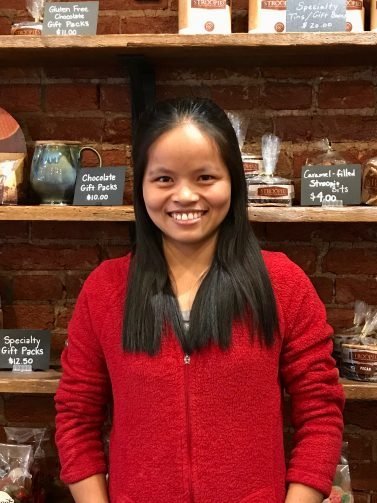
I am from Burma. I live in the United States almost 5 years.
Yeah, the first time I came here, I thought that all the United States look pretty and it’s kind of like not a jungle. It’s the house – buildings also also pretty. Building is all high buildings, I thought, but not like this… I went here in 2013 – it was July 17. So it is very very different. I went – I had a sponsor. It is the Mennonite Church that sponsor my family. So I live with one American family. I don’t have already home, so I live two week there. Yeah, but I can’t speak before. I don’t understand anything. I wanted to talk to people, but I can’t. Just only I smile and then the people say, “Hi, Mary! Good morning!” And I only smile, I didn’t say anything.
I want to learn English, because there is a lot of – I cannot speak, I cannot go appointment or doctor’s appoint, and I cannot help my friends. I can speak English and I can do just a bill, or a paper – just writing everything. So a lot of letter I got is English English – not Burmese – so I need to learn!
I really really miss my family. My parents and my all siblings live in Burma, so I never seen them for long time. So I can talk (to them) right now, before – this is very good for me. Before, I can’t talk – I think 2013, I came here in 2013. 14 and 15 I can talk (to) my parents. But I want to see (them), and I can’t see (them).
I want to try citizenship. So I get citizenship, I want to visit in Burma because I miss my family.
Andy
Lancaster, PA
“You know when you talk about immigration in other countries, maybe they don’t get it. But in America, I say to myself, if people don’t understand what immigration means in America it is just because they don’t want to listen. This is a common history we have. You know, the difference is there are people who came here 400 years (ago), you have people who came here maybe before, and you have people who just landed today! That’s a difference, but this is a country of immigration.“
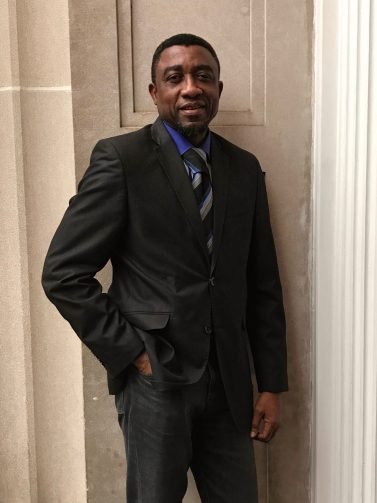
I come from the Democratic Republic of Congo, and I have been living here for 14 years now.
I got here in the night, and I can remember after getting off the plane – I took a taxi. Someone came to pick up me from the airport, and we had to drive from New York to Redding. And I was a little bit disappointed when I saw like for two hours and something and I was just looking at the farms, and driving in the middle of these farms and things like that. So I was like, “Where is the American I saw in the movies?” Okay, yeah, that’s my first day in America.
When I got to Redding, three months later I started working. For me I was looking for job. I would say the first month I started working, and I would say that what helped me is that I didn’t have a language barrier. Because that’s the biggest thing, you know, I didn’t have language barrier. I had visited English-speaking countries before coming here, and I was speaking English already. Yeah, there were maybe some difficulties – you know, my accent and the American accent. Sometimes I couldn’t catch everything, but at least I could express myself.
There was a family that took care of — you know – me and my family in that gap when I was looking for a job. And I would say that even after getting that job, they were still there. You know, so I would say that is the good thing about America – you still have people who want to help.
Yeah, I think in the civic engagement, maybe if I got to nail on the immigration matter – some people can understand what is immigration. You know when you talk about immigration in other countries, maybe they don’t get it. But in America, I say to myself, if people don’t understand what immigration means in America it is just because they don’t want to listen. This is a common history we have. You know, the difference is there are people who came here 400 years (ago), you have people who came here maybe before, and you have people who just landed today! That’s a difference, but this is a country of immigration. Everybody came from somewhere. The only difference is that we came in different – you know – periods, but we are still here and we have to work together.
When you hear things like, “Have you had the chance to see lions or leopards in the streets in Africa?” I don’t feel sad because of the question, but I feel sad discovering that people who are asking those kind of questions don’t have instruction, knowledge. And I didn’t think that, when I was out of America, that you can find those kind of people who are so – would I say… living in a small box of themselves. I never see the lions, never – even if I am from Africa. I have never seen the lions, and I never see the lions in the streets. And mostly those kind of questions are not honest questions. It has an explanation, it has something behind it. I feel a kind of racism a little bit in those kind of questions.
If you look at – I think it is chapter 5 or something of the UN Charter about freedom, something like that – it says that if you feel not comfortable where you are living because you were oppressed or whatever because of your beliefs or the political vision that you have, you have the freedom to leave that place and go live wherever you feel comfortable. So when people come here… And that’s why I say politicians need to tell the truth to people, because sometimes they know how to play psychologically with people. Like people don’t come here to get American jobs, they come here to add to the American economy. I was telling you earlier that in Lancaster in 19 – I mean 2014, immigrants contributed to the creation of 1,026 jobs. So this is something to the economy of Lancaster, and the economy of Lancaster adds to the economy of America. It is the American economy, it is something! So we still need people here
Lina
Pittsburgh, PA
“Something that I have done and I feel proud of it is first the education of my children. My children they go to school – they are bright and they are smart at school. And whenever you go, even if you are not going to school but in the road you will see people, “Oh, you have beautiful children! They are respectful.” So that one, it give me hope of a bright future of my children…”
Photo Credit @joy.bittner
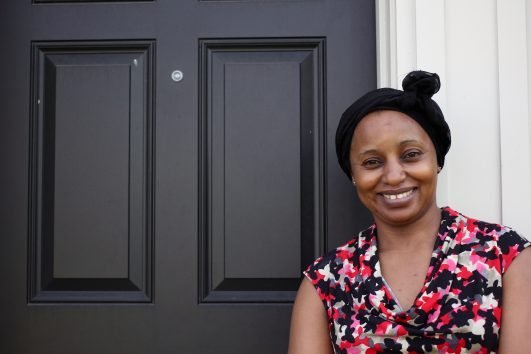
I am originally from Congo DRC, and this is my fifth year in the USA. I am planning to apply for citizenship.
Our first house, it was an old house – you may see like it is going to collapse today. That’s the way it was. So the children when they reached it, they said, “That is our house! This is America with such house! No, let’s go back to our house in Windhoek…” Then they were crying. We said, “No, take it easy. This is the beginning. We never know.” That was my first day in the USA.
I remember at my first work – they made me to be shy. Whenever you speak something they will repeat it in a way like to make fun of you. Sometimes they will ask me, “What did you say?” I am going to write it down for them. I write it down – and Oh! Okay! But then others, even if you write it down, they start laughing at you. I said what about me? I can speak English, but they are teasing me about my accent… What about those who don’t speak English?
I like Pittsburgh. I consider it like – that my village. My country, that’s Pittsburgh! People are friendly. You know – when I came in USA, whenever I was in the bus people used to greet me, “Hi hi hi!” And you know, the fact that people are greeting you – you feel like oh, I am also considered. You feel good and you feel at home. In Pittsburgh they consider refugees and immigrants, they are welcome. It’s not like in the other cities. In the other states we used to hear from our friends that, “Oh, here they don’t consider refugees. They don’t even look for us jobs.” But here it is so different…
Something that I have done and I feel proud of it is first the education of my children. My children they go to school – they are bright and they are smart at school. And whenever you go, even if you are not going to school but in the road you will see people, “Oh, you have beautiful children! They are respectful.” So that one, it give me hope of a bright future of my children. So it is something which I am made proud of it. And I know that the USA it is a country of opportunities, and with the way I have raised them, with the way they are – they will have a bright future.
My first born, she want to become a doctor. And my second born, she grant what? A scholarship for a private school. She want to become a teacher. And then my boy who is twelve years old – he just changing. All those years he used to say of becoming an astronaut. Now surprisingly, last year he told me that, “I want to become a soccer player.” So we’ll see. Maybe because he is still young, he does not know yet what he will become.
I was in schooling at the college in my country. I did not complete due to the persecution. And then in Namibia I got a scholarship. They wanted to empower women in the refugee camp. Then I was among those three refugees who were granted a scholarship to the University of Namibia. And I didn’t – I started, I did education. Even back home, I did education. Then I didn’t complete due to the resettlement. I have been resettled to USA, so now my dream is to complete my tertiary study.
